External Bifold Doors: UK Buyer’s Guide for Exterior Bifolds
Table of Contents
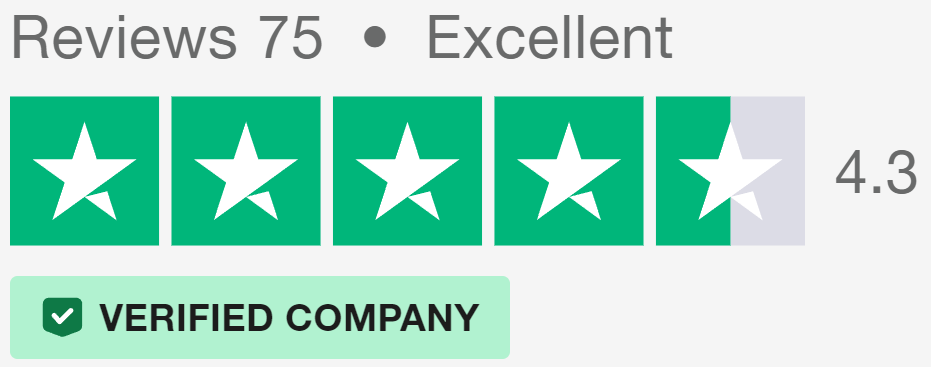
External bifold doors have gained popularity among British homeowners due to their functionality and stylish design. This guide will help you understand the essential aspects of these doors, including their types, benefits, materials, and relevant UK regulations.
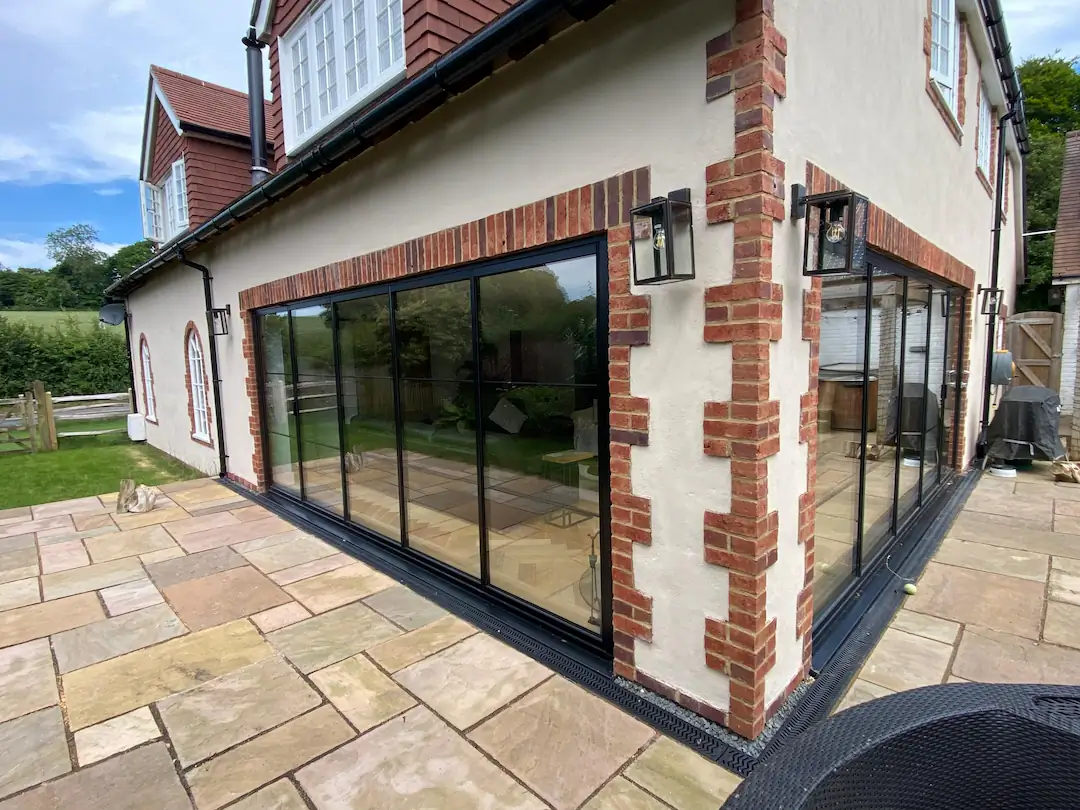
What Are Bifold Doors?
Bi-folding doors (also known as folding doors, bifolds, or concertina doors) consist of multiple panels that fold back against each other when opened, creating a wide opening to the outside. These doors are ideal for anyone looking to let in more natural light and improve access to their outdoor spaces. By folding neatly to one side, they allow for a more open and airy feel in your home.
Types of External Bifold Doors
There are various types of external bifold doors, classified mainly by the material they are made from:
Wooden Bifold Doors
These doors provide a traditional and elegant look, often chosen for their aesthetic appeal. Wood can be stained or painted to match the existing décor of your home, offering a personalised touch.
uPVC Bifold Doors
Known for their durability and low maintenance, uPVC bifold doors are an economical choice. They come in a range of colours and finishes, including options that mimic the look of wood, without the upkeep.
Aluminium Bifold Doors
Aluminium doors are favoured for their strength and slim frames, which allow for larger glass panels, slim sight lines, and better views. They’re resistant to rust and corrosion, making them a durable option that can withstand harsh weather conditions.
Benefits of External Bifold Doors
Space-Saving Features
Bi-folding doors fold back on themselves, requiring minimal space to operate. This makes them perfect for homes with limited space, allowing for a more efficient use of both indoor and outdoor areas.
Aesthetic Appeal
With large glass panels, bifold patio doors provide unobstructed views of your garden or patio. The variety of finishes and styles available in wooden, uPVC, and aluminium options ensures a match for any home design.
Versatility and Functionality
Bifolding doors can be used in various outdoor settings, from large open-plan areas to smaller spaces where traditional doors might be impractical. They offer flexibility in usage; you can open them fully for a large opening or partially to allow fresh air while maintaining a barrier.
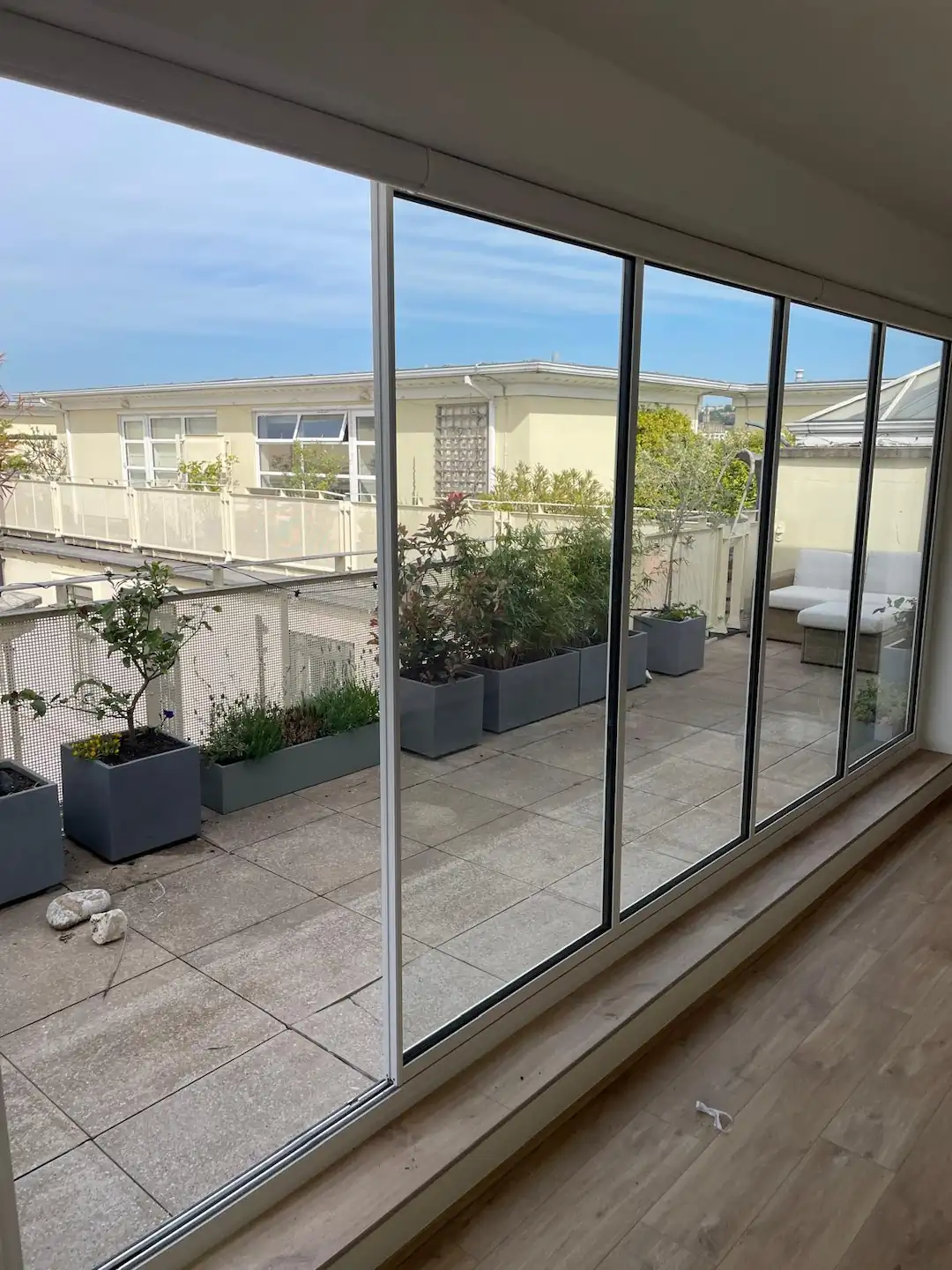
Materials for External Bifold Doors
Wooden External Bifold Doors
Wooden external bifold doors are valued for their traditional and natural look. They provide excellent insulation and can be customised with various stains and paints to suit the style of your home. However, they require regular maintenance, such as painting or staining, to protect against weathering and ensure longevity.
UPVC External Bifold Doors
UPVC bifold doors are a popular choice due to their durability and low maintenance. They are resistant to rot, rust, and corrosion, making them ideal for all weather conditions. Available in a range of colours and finishes, including wood grain effects, uPVC doors are also cost-effective. While they may not have the same aesthetic appeal as wooden doors, they offer excellent value for money and practicality.
Aluminium External Bifold Doors
Aluminium bifold doors are known for their strength and slim profiles, allowing for larger glass panels and better views. They are lightweight yet strong, providing excellent security and durability. Aluminium doors require minimal maintenance and are resistant to rust and corrosion. They also offer good thermal efficiency when fitted with proper insulation. The sleek and modern appearance of aluminium makes it a popular choice for contemporary homes.
When Are External Bifold Doors Suitable?
Ideal Home Styles
External bifold doors are suitable for various home styles, from contemporary to traditional. They are often used in modern homes where clean lines and open spaces are desired. In period homes, wooden bifold doors can maintain the traditional aesthetic while offering modern functionality. The choice of materials and finishes allows these doors to blend seamlessly with different architectural styles.
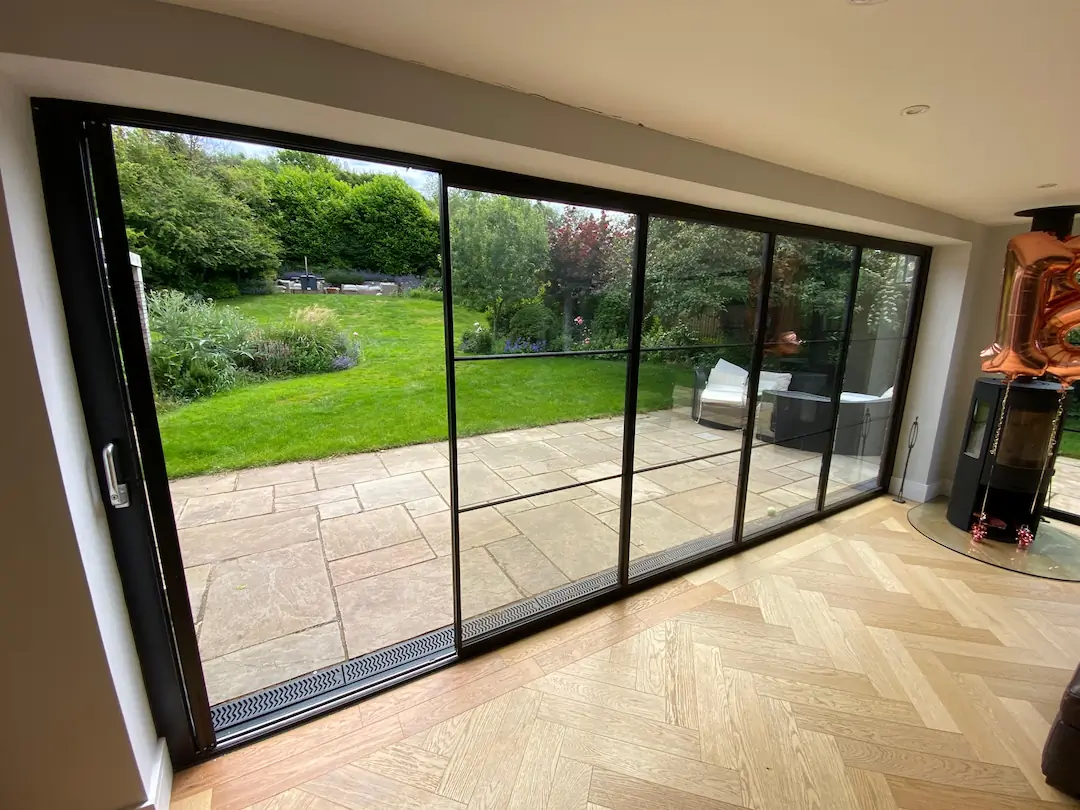
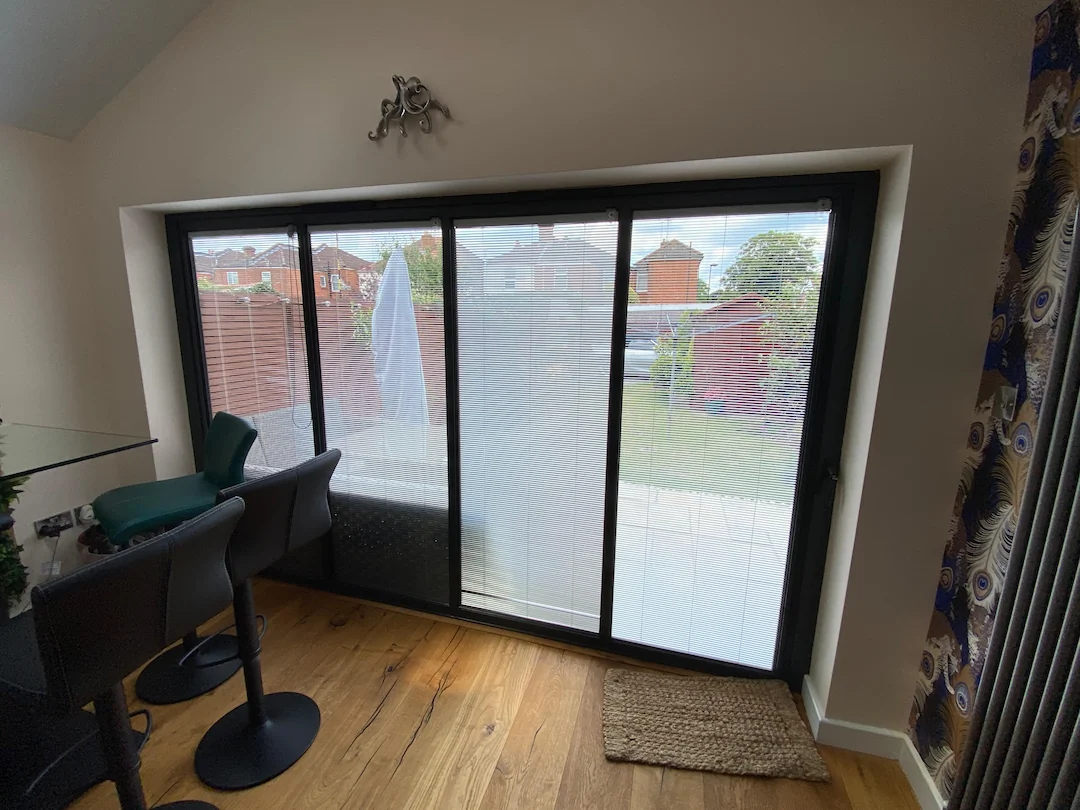
Room and Space Considerations
Bifolds are ideal for rooms that lead to outdoor areas such as gardens, patios, or balconies. They are particularly useful in kitchens, living rooms, and dining areas where maximising natural light and easy access to the outdoors are priorities. When considering bi-folding doors, ensure you have enough wall space to accommodate the folded panels when the doors are fully opened.
Climate and Weather Conditions
In the UK, climate and weather conditions play a significant role in the suitability of bifolding doors. They are designed to be weather-resistant, but the material you choose can impact performance. For example, aluminium and uPVC doors are highly resistant to moisture and temperature changes, making them ideal for the UK’s variable climate. Wooden bifold doors, while aesthetically pleasing, require more maintenance to protect against the elements.
Security and Safety of Bifold External Doors
Key Security Features
Security is a primary concern for any external door, and bifold doors are no exception. High-quality bifold patio doors come with multiple security features to ensure your home remains protected. Look for doors with multi-point locking systems, which secure the door at several points along the frame. Additionally, toughened or laminated glass adds an extra layer of security by making it more difficult to break through the glass panels.
Safety Considerations for Families
For families, safety is just as important as security. Modern bifolding doors often include features such as finger-safe gaskets to prevent fingers from getting trapped between the door panels. Anti-lift devices are also crucial, as they prevent the doors from being lifted out of their tracks. Furthermore, some glass bifold doors come with built-in blinds between the glass panels (integral blinds), which can be safer for homes with young children, as they eliminate the risk of cords.
When selecting bifolding doors, ensure they meet recognised safety standards. Check for certifications like PAS 24, which indicates enhanced security performance.
Energy Efficiency of Exterior Bifold Doors
Insulation Properties
The insulation properties of exterior bifold doors play a crucial role in maintaining the energy efficiency of your home. High-quality bifold doors are designed to minimise heat loss, keeping your home warm in the winter and cool in the summer. Look for doors with a low U-value, which indicates better insulation performance. Materials like aluminium often feature thermal breaks, which are barriers within the frame that reduce heat transfer, enhancing energy efficiency.
Energy-Saving Glass Options
The type of glass used in external glass doors significantly impacts their energy efficiency. Double glazing or triple glazing is essential for improving insulation (single glazed doors are only suitable as internal doors). Low-emissivity (Low-E) glass, which has a special coating to reflect heat back into the room, can further enhance energy efficiency. Additionally, argon-filled glass units provide better insulation compared to standard air-filled ones, reducing heat transfer and improving overall thermal performance.
Choosing the right combination of frame material and glass type is vital for maximising the thermal performance of your bifolding doors. Ensure that the doors meet or exceed the energy performance standards set by UK building regulations, such as Document L, which covers the conservation of fuel and power.
Customisation Options for External Folding Doors
Sizes and Configurations
External folding doors come in various sizes and configurations to suit different spaces and requirements. You can choose from two to seven panels or more, depending on the width of the opening. Custom-sized doors are also available to fit non-standard openings, ensuring a perfect fit for any home. Configurations can include options where all panels fold to one side or where they split and fold to both sides, offering flexibility in how the space is used.
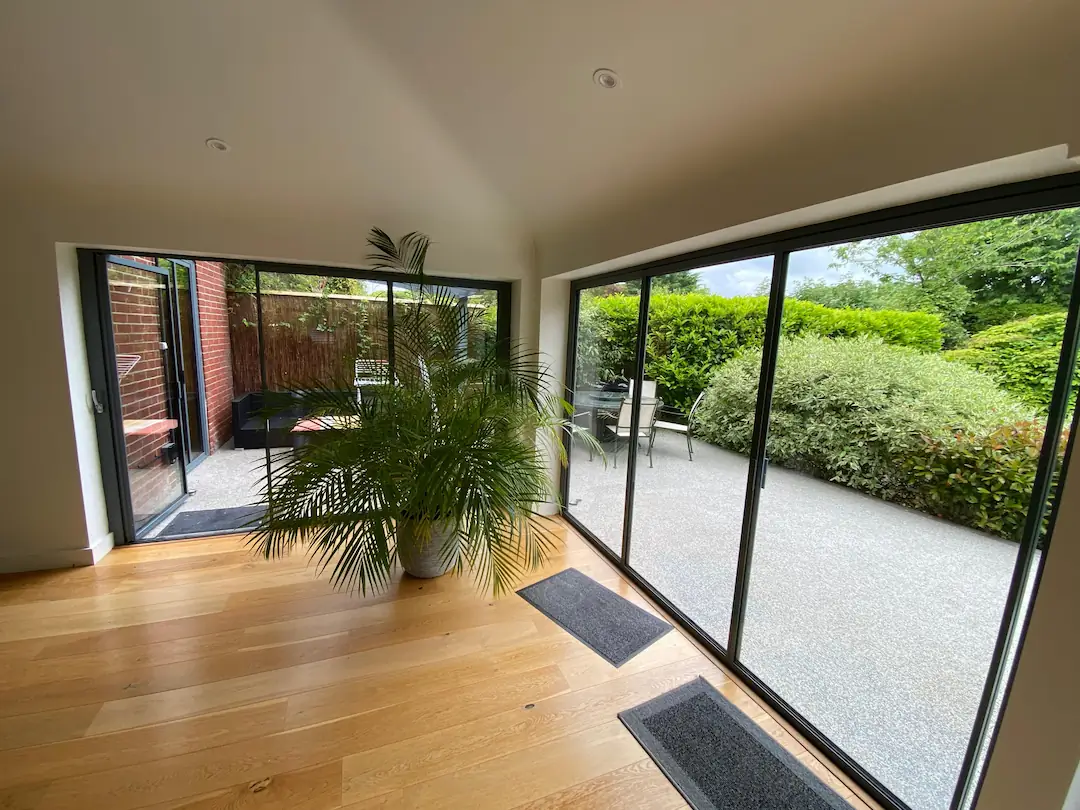
Colour and Finish Options
There are numerous colour and finish options available to match your home’s decor. Wooden bifold external doors can be stained or painted in a variety of colours to complement your existing woodwork or interior design. UPVC and aluminium bifold doors also come in a range of colours, including contemporary greys (such as anthracite grey) and blacks, as well as traditional whites and wood-effect finishes. Powder-coated finishes for aluminium doors provide a durable and long-lasting colour that resists fading and weathering.
Additional Features and Accessories
To further customise your bifolding external doors, consider additional features and accessories. Integrated blinds can be fitted between the glass panels for privacy and sun control without the need for external window coverings. Security enhancements such as upgraded locks and reinforced glass are also available for added peace of mind. Additionally, you can opt for features like low thresholds, making it easier to move between spaces.
Maintenance and Care for External Bifold Doors
Routine Cleaning Tips
Regular cleaning is essential to keep your bifolding external doors looking good and functioning properly. For wooden doors, use a gentle wood cleaner to remove dirt and grime, followed by a suitable polish or oil to maintain the finish. UPVC doors can be cleaned with a mixture of warm water and mild detergent. For aluminium doors, a soft cloth and non-abrasive cleaner will suffice. Ensure that the tracks are kept free of debris by vacuuming them regularly to prevent any obstruction in the door’s movement.
Long-Term Maintenance Advice
Long-term maintenance varies depending on the material of your bifolding doors. Wooden doors require periodic resealing, staining, or painting to protect against weather damage. Inspect the doors annually for signs of wear, such as cracking or fading, and address these issues promptly to extend their lifespan.
UPVC and aluminium doors require less maintenance but should still be checked regularly. Ensure that all moving parts, such as hinges and locks, are lubricated to maintain smooth operation. Tighten any loose screws and replace worn-out weather seals to maintain energy efficiency and prevent draughts.
Additionally, check the condition of the glass panels. Clean them with a suitable glass cleaner and inspect for any cracks or damage. Replace any damaged glass promptly to ensure safety and insulation performance.
Relevant UK Building Regulations and Certifications
Building Regulations for External Bifold Doors
When installing bifolding doors in the UK, it’s essential to comply with relevant building regulations to ensure safety, energy efficiency, and structural integrity. Part L of the Building Regulations, which deals with the conservation of fuel and power, requires that doors meet certain thermal performance standards. This is measured by the U-value, with lower values indicating better insulation properties. For bifolding doors, the current requirement is a U-value of 1.6 W/m2 K or lower.
Required Certifications and Standards
To ensure that your bi-folding doors meet the necessary standards, look for products that carry recognised certifications. The British Fenestration Rating Council (BFRC) provides energy ratings for windows and doors, similar to the labels seen on appliances. An A-rated bifold door will offer the best energy efficiency. Additionally, the Secured by Design certification indicates that the doors have been tested to meet enhanced security standards, which is particularly important for external doors.
Another key certification to look for is the PAS 24, which relates to enhanced security performance for doorsets. This standard ensures that the door has been tested for resistance to forced entry, providing added peace of mind. For the glass used in bifold doors, compliance with British Standard BS EN 12150 for toughened glass and BS EN 14449 for laminated glass is crucial for safety and durability.
Compliance and Legal Considerations
Before installing bifold doors, it’s important to ensure that your project complies with local planning regulations. In most cases, replacing existing doors with bifold doors does not require planning permission. However, if you live in a listed building or a conservation area, you may need to seek permission from your local authority. It’s advisable to check with your local council to understand any specific requirements or restrictions.
Additionally, if your installation involves significant structural alterations, a building control application might be necessary. This ensures that the work complies with current building regulations and is safe. Hiring a qualified installer who understands these regulations can help streamline the process and avoid potential issues.
Frequently Asked Questions
Do Bifold Doors Require Planning Permission?
In most cases, replacing existing doors with bifolding doors does not require planning permission. However, if you live in a listed building or a conservation area, you may need to obtain permission from your local planning authority. Always check with your local council to ensure compliance with specific local regulations.
How Do Bifold Patio Doors Handle Different Weather Conditions?
Bifold patio doors are designed to withstand various weather conditions, but the material can affect performance. Aluminium and UPVC doors are particularly good at resisting moisture and temperature changes, making them suitable for the UK’s variable climate. Wooden bifold doors, while attractive, require regular maintenance to protect against weathering. Ensure your bifold doors have proper weather seals and thermal breaks to improve insulation and prevent draughts.
Can Bifold Doors Be Used in Listed Buildings?
Using bifolding doors in listed buildings can be more challenging due to stricter regulations aimed at preserving the building’s character. You will likely need to obtain permission from your local planning authority. In some cases, using materials and designs that closely match the original architectural style can help gain approval. Consulting with a specialist in heritage buildings can provide valuable guidance on navigating these regulations.
How Much Do External Bifold Doors Cost?
The cost of exterior bifolding doors varies depending on the material and the quality. Wooden external bifold doors typically range from £1,500 to £4,000 or more, depending on the type of wood and customisation options. UPVC external bifold doors are usually more affordable, with prices starting around £1,000 and going up to £2,500. Aluminium bifold doors, known for their strength and sleek design, generally cost between £1,500 and £5,000.
Obtaining multiple quotes from reputable suppliers and installers can help ensure you get the best value for your money. Additionally, factor in any potential energy savings from improved insulation, which can offset some of the initial costs over time.
For more details, please see our Bifold Doors Price Guide.
Comparing External Bifold Doors to Other Door Types
Bifold Doors vs Sliding Doors
Exterior bifold doors and sliding doors are both popular choices for connecting indoor spaces to gardens or patios, but they have distinct differences. Bifolding doors open fully, allowing for a wider, unobstructed opening as the panels fold back neatly. This feature is particularly beneficial for entertaining or moving large items in and out of the house. In contrast, sliding doors typically have one fixed panel and one that slides, limiting the width of the opening to about half of the total door space.
Sliding doors, however, can offer larger glass panels and a more minimalist look, which some homeowners prefer. They also tend to have fewer moving parts, which can mean less maintenance. When deciding between the two, consider the importance of a wide opening versus the visual impact of larger glass panels.
For a more detailed comparison, please see our bifold vs sliding doors comparison article.
Bifold Doors vs French Doors
French doors are another alternative to bifold door systems, offering a classic, elegant look with two doors that swing open from the centre. Unlike bifolding doors, which fold back completely, French doors can limit the flow of movement if space is restricted. They are better suited for smaller openings where a full wall of doors might be impractical.
French doors typically require more space to open fully since they swing outward or inward, which might not be ideal for small patios or interior spaces. Bifold doors, with their folding mechanism, are more space-efficient. However, French doors can be easier to operate and are often less ex
Looking for External Bifold Doors for your Home or Business?
Vision Glass Doors is a designer, manufacturer, and installer of premium door systems with over 20 years’ experience and 5,000 installations across the UK.
All our systems are made to measure, designed, and fabricated at our manufacturing facility in Luton, Bedfordshire. We offer installation within a 100-mile radius.
Our leading range of door systems include Ultra Slim – Slide and Turn Doors, Slimline Sliding Patio Doors and Frameless Glass Doors.
Please click Quick Quote Online for a free quotation within 24 hours. Alternatively, call or email us on 01582 492730 or at info@visionglassdoors.co.uk.

